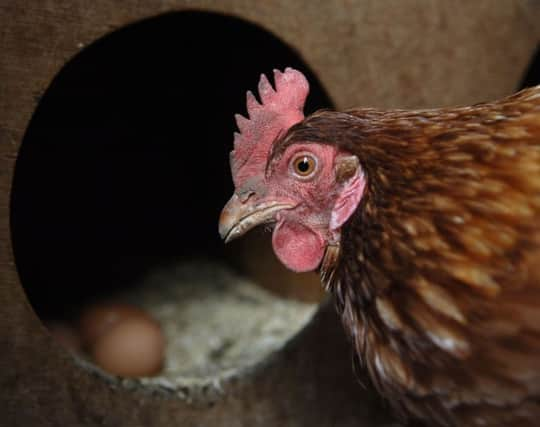Craig Houston: Free range fears for egg producers
This article contains affiliate links. We may earn a small commission on items purchased through this article, but that does not affect our editorial judgement.


Exactly the kind of vexing question you hope for of a lazy weekend. Indeed, whilst the myriad of ways to enjoy your eggs subsists, the choice of product on the shelf has seen something of a culture shift such that “free range” is the consumer choice.
Stories of hen welfare and a mutual gasp at the same saw standards overhauled and collective consciences appeased. The result was healthy and happy hens and tastier eggs, and a marginally more expensive product.
Advertisement
Hide AdAdvertisement
Hide AdBut the cost was worth it in the eyes of consumers with a new-found appreciation for welfare and quality over cut-price, quick-fix produce. Concerning then, that “free range” eggs are currently facing a fight for their protected places on shop shelves.
The recent avian flu outbreak across Europe has been raising cholesterol across the industry since December of last year when the government issued a prevention order requiring farmers to keep their birds inside to help prevent the spread of the disease. EC regulations meaning free range eggs cannot be marketed as such after 12 weeks of hens being housed inside.
With the government restrictions now ended (save for around a quarter of British farmers in high-risk zones), there may be some respite for farmers worried at the prospect of premium product pricing taking a hit when margins are already slim.
As attempts to persuade the EU to temporarily relax regulation stutter, sympathy from other parts of the beleaguered dairy industry is probably in short supply. It’s not that such sentiment and support isn’t mutual, but as recent rumbles over the price of milk have shown, each have their own survival problems to contend with.
Farmers and their cows might be forgiven for looking across at free range hens doing cartwheels in their ample allocation of four square metres of grass, longing for the some of the same culture change, and regulation, that brought about “hen hotels”. One that won’t leave cows jealously peering out from their sheds dreaming of greener pastures. Oh to those who have been left behind. Feels like we’ve heard that sentiment a lot of late in other spheres.
The whims of a well-kent chef
Rather than free range eggs setting a precedent for the same standards of quality and welfare and taking a foothold across the dairy and poultry sectors, many parts of it languished at the mercy of supermarket pricing, and individual indifference at the efficacy of home-grown food and drink produce.
Enter Jamie Oliver, food industry titan. Hilariously haphazard chef. Self-appointed guardian and champion of home-grown British produce. Hurrah for the latter. His effect on popular culture is as tangible as it probably is perplexing to the farmers of the nation. He speaks, people listen.
Advertisement
Hide AdAdvertisement
Hide AdAsda certainly were as they announced the launch of their own free range milk. A profound about-turn after months on end of ill-feeling between, and hard-bargaining with, the country’s farmers. Expect to see free range chickens more prominently placed on shelves in coming weeks – another of Oliver’s recent campaigns. Isolated, these revolutions are not. Such a marked shift in industry mindset is a harbinger of a wider, deeper change in attitudes.
Prescience of provenance
The erosion in production standards as price competition became a global rather than a local issue is now very much under the spotlight. And the products we take for granted are those that are now sensing a lifeline for a return to an environment where they might thrive rather than simply survive.
A degree of Scottish (or British) “terroir” that escaped many of our most fundamental food and drink products in the face of globalisation is now making a welcome reappearance. Eggs’ temporary fight for free range status aside, it’s a timely reminder of where our own strengths in food and drink production may lie when progressive attitudes and appropriate legislation and regulation provide an environment which effectively protects and promotes quality domestic produce.
Pasture promise
Asda’s “pasture promise” initiative may be an initial step on the road to formal safeguards – it guarantees that all milk sold under the label comes from cows kept outdoors for at least six months of the year. The cows will be forgiven for hoping so. And stablemates will be praying produce provenance proliferates into their own domain.
So whilst people keep their eyes peeled for cows in fields, here’s hoping we’re toasting free range eggs again this Easter, and many more home-grown examples of the highest quality food and drink.
• Craig Houston is a solicitor at law firm MacRoberts
